In an effort to bring you some new voices on Ottsworld, here is a guest post from Shelley and Lars. I ‘met’ Shelley when she sent me a message on social media and mentioned that they were stuck in South Africa during the pandemic and ended up having a once-in-a-lifetime experience. I asked her to share her fascinating story because it’s a great reminder that acts of travel kindness are still happening during these tough times. All opinions, experiences, and photos here are theirs. –Sherry
We sipped hot chocolate on the bamboo couch, watching the hazy orange filter of dusk softly settle among the parched African bush. This was our evening ritual in South Africa. Gazing out into the fading landscape as pocket-size bats dipped and darted around us, delighted that nightfall was finally returning.
This was the magic hour, the finale of the day.
With the stars beginning to peep through the darkness, the shadows of the bush merged in the dimness. You can no longer be certain of what you are seeing and so you listen very carefully.
The crunch of a dry leaf. An announcement of something in the shadows. A soft grunt. Senses strain to tune in. You tilt your head to capture the slightest rupture in the silence. The snap of a breaking branch.
Buffalo. Or Kudu maybe. The next sound we heard, gave us no doubt as to what was lurking nearby.
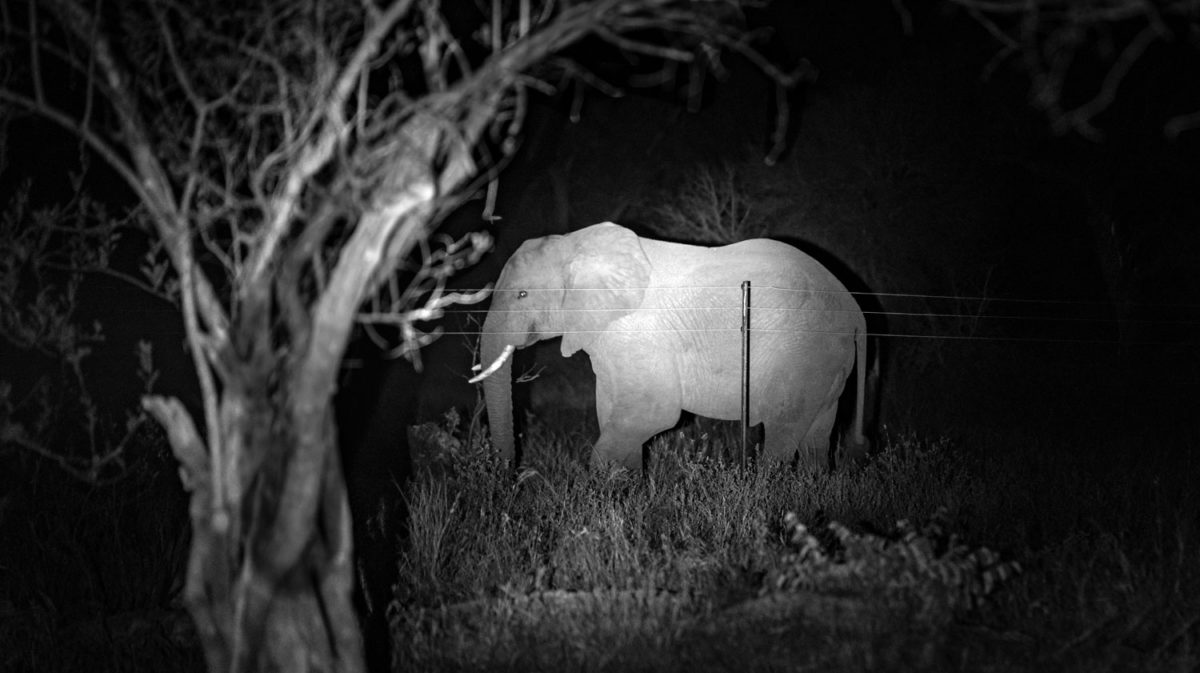

COVID-19 Across the World
South Africa was where we found ourselves when Coronavirus waywardly hitched a ride on humankind, its molecules multiplying in every corner of the world.
And it was here that our travel plans – and honeymoon – were scuppered and undone.
COVID has been cataclysmic in its spread across the globe. We have all been forced to adapt, to change plans, to stay indoors, and to find our way through the fog of uncertainty.
The media is flooded with stories of misery, gloom, and heart-wrenching situations wrought by this pandemic. The tiny voice of change and hope is lost beneath the rubble. All we can see is the desolation, the damage, and the decay of our norms. Change is inevitable, but for many, it may take a while for any silver linings of the pandemic to shine through the cracks. But they are there.
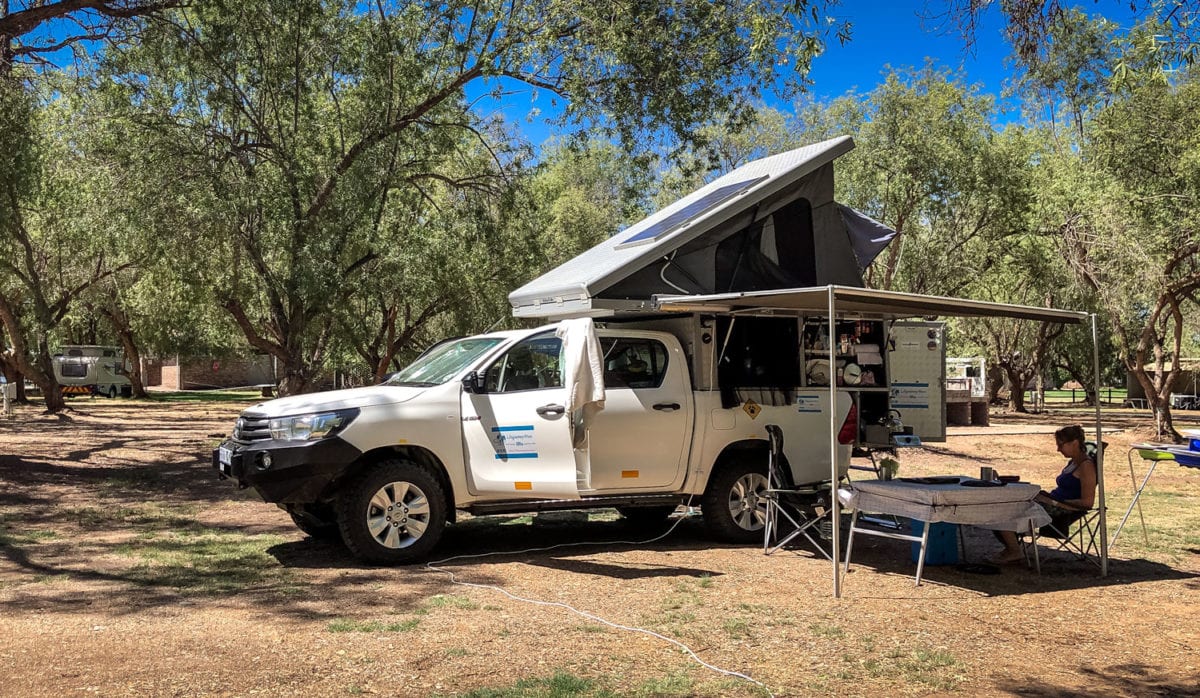

An Africa Overland Tour Adventure
Arriving in South Africa in January 2020, we were excited to begin our overland tour adventure. We bought our bush camper – a 4×4 with a tent on top (which we fondly called ‘Bucky’) and set off. South Africa was just the first of many African countries to be included in our travel plan. Cape Town was a significant stop on our journey, offering a mix of iconic sights and remote areas.
Before we arrived in Africa, we’d arranged to pet-sit for a few weeks, to have a break from camping. So, in early March, we arrived at the small remote town of Prince Albert, in the Western Cape. With a quick handover from the owners, we settled in for the next six weeks looking after two adorable dogs, Maggie and Murph.
Two weeks into our house-sit, South Africa went into a strict lockdown. The Australian government sent messages via their SmartTraveller App requesting we return home immediately. Our home, however (our trusty Bucky), was sitting in the driveway. Having sold all of our belongings three years previously (for a travel adventure), there was no home to return to.
That was when our first silver lining shimmered through the cracks.
Where better to be in lockdown than in a small, remote town on the fringe of the desert? The idea of battling the airport crowds and then being confined on a packed airplane back to Australia wasn’t appealing. Fortunately for us, we’d bought our travel insurance before COVID was a ‘thing,’ so we were covered for any private hospital expenses. We, therefore, decided that staying seemed far safer than leaving.
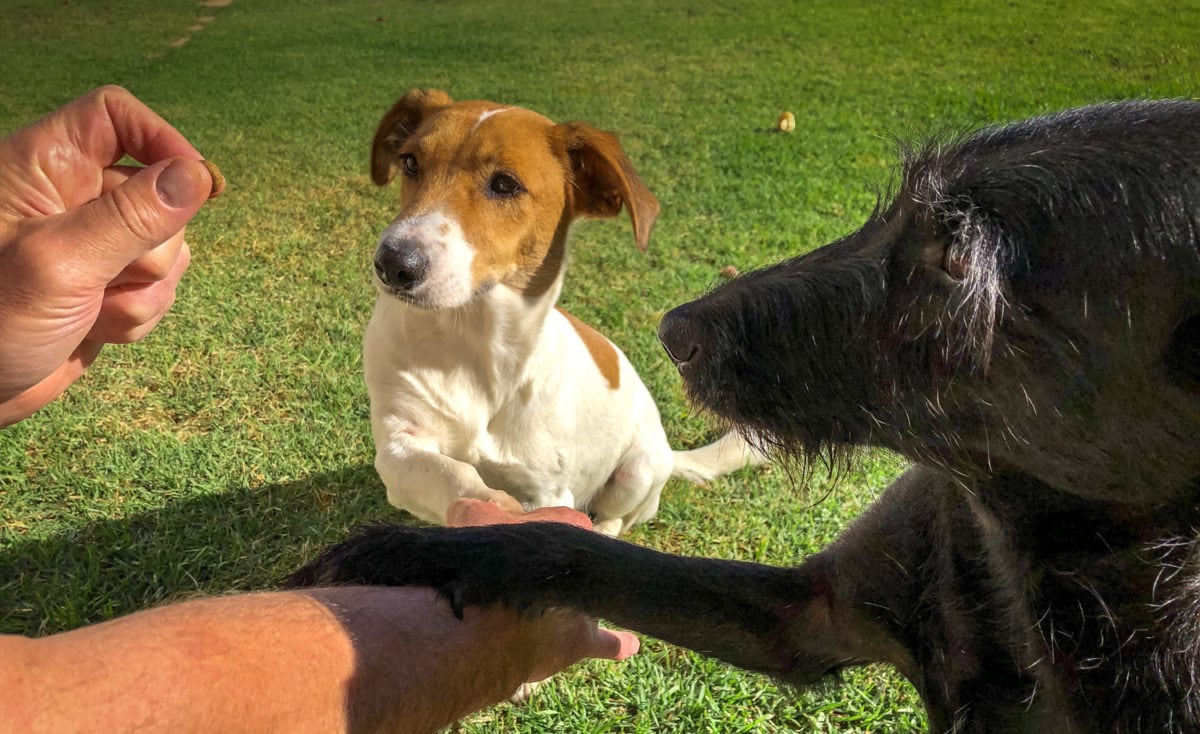

South Africa’s COVID Lockdown
Lockdown meant that you could only leave home for groceries or medical reasons. Additionally, only groceries were allowed to be sold – no clothes, no non-food items at all. Alcohol and cigarettes were banned (can you imagine governments trying to enforce that in the Western world?).
To watch South Africa from within, already grappling with widespread poverty and corruption, struggle to prevent a disease that could effectively wipe out millions was a sobering moment. Millions of people in South Africa’s townships do not have running water and share communal drop toilets. They live day to day, hand to mouth. Extended families share a one-roomed hut. Tuberculosis and HIV are widespread. The staple diet of ‘pap’ (maize) does the job of filling empty tummies but has little to no nutritional value. The desperation and despondency were tangible.
We heard news reports about many in the Western world refusing to wear masks, calling it an affront to freedom and opposing lockdowns because of the restriction of public liberties. We watched this news while millions in South Africa were struggling to protect themselves in the simplest of ways, such as washing their hands. Everyone wore masks in South Africa – though many were handmade or makeshift – but there was no murmur of any affront. Just fear of how they would survive.
Travel changes you, there is no doubt, but to witness such a daunting situation in an environment which is a million miles from your ‘norm’ – it seeps that bit deeper into your soul.
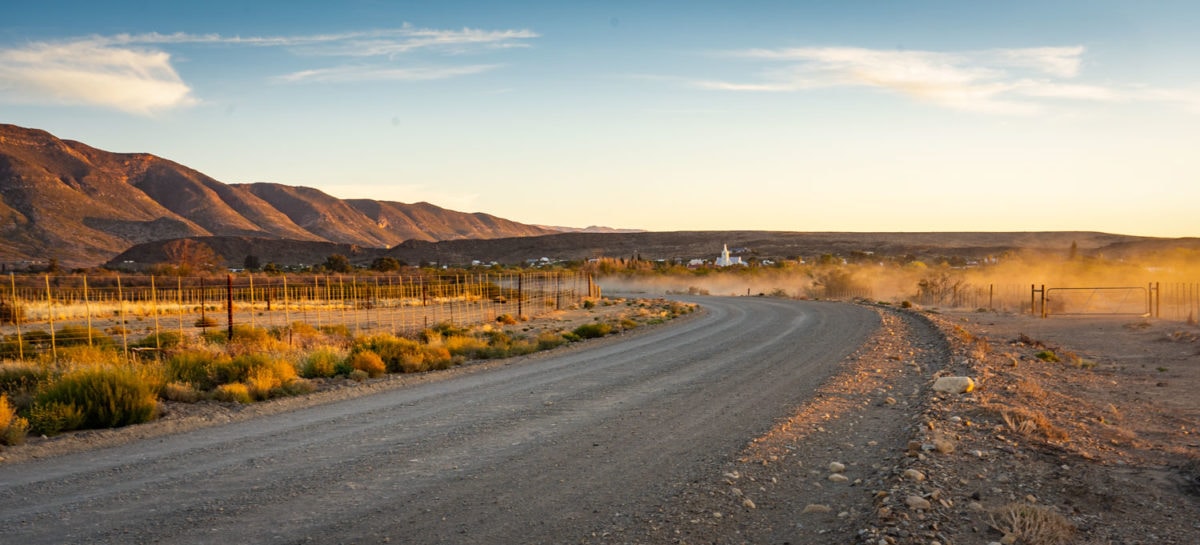

Finding the Silver Linings in Times of COVID
That six-week house sit turned into five months.
As avid travelers stuck in one place for almost half a year, you’d think we’d go crazy right? No. We looked into those cracks and low and behold those slivers of silver linings streamed out. They are easier to see I think, when you are reminded of how lucky you really are.
In those five months, we wrote fresh articles for our travel blog, updated old posts, took free online courses, and practiced our photography with the help of an array of feathered friends who flitted around the garden, showing off their unfettered freedoms. And the kicker on top? All this was rent-free. An abundance of silver linings and acts of travel kindness.
At the end of the five months, feeling slightly guilty that our personal COVID experience was more congenial than catastrophic, we found out that the owners were able to return home. Although by this time, lockdown regulations in South Africa had been relaxed, leisure travel was still forbidden, and all internal provincial borders remained closed.
COVID had rudely interrupted our plans to overland Africa, but up to now, we had weathered the storm, basking in the many rays of sunshine burning through the blackened clouds.
However, our lives were about to be changed.
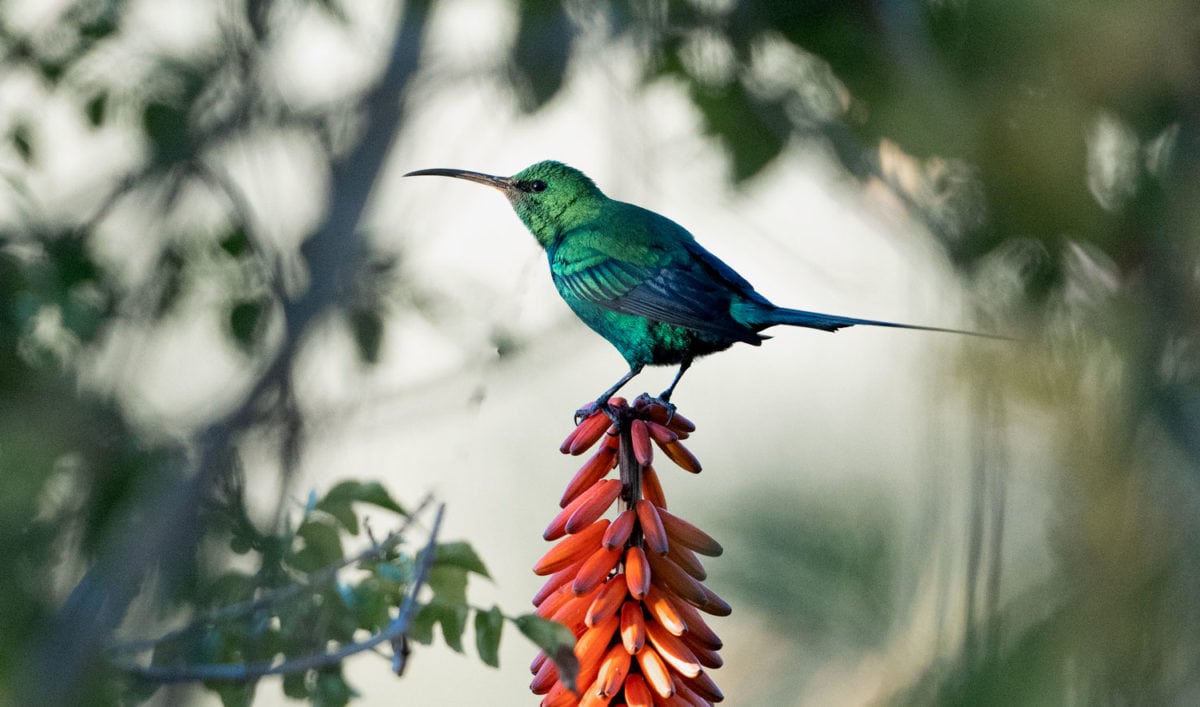

Crossing South Africa’s Garden Route
The owners had been staying at their property on the other side of South Africa, in Limpopo, preparing for an overland trip. The government was now allowing those who were changing residence an exemption to cross interprovincial borders.
The family, knowing that we couldn’t travel for leisure, suggested we swap with them and change residence to their ‘Bush Camp.’ The bush camp, they added, was ‘very basic,’ but they would be happy for us to stay there until we could travel to South Africa again. We were extremely grateful fr the,eir kindness. Victoria Falls was one of the significant destinations on their journey, showcasing the iconic sights and remote areas of the expedition.
Saying Goodbye to our Comfortable Bubble
At the end of July, with parting licks and tail wags from our cute canine buddies of the last five months and, of course, a few tears from me, we set off on the three-day trip across South Africa to our new refuge.
Leaving the seclusion of our small-town sanctuary felt kind of surreal. In our little bubble, it had been too easy to shut out the plight of the outside world. The very plight that made it clearer to see our own silver linings. We had been shielded as we drank our morning coffee in the sunshine, admiring the iridescent sunbirds sip nectar from the flowers and the yellow weavers build their intricately designed nests.
Leaving our privileged shelter was like emerging back into the brightly lit foyer of the cinema after being totally engrossed in a movie – a world apart from you own life. An abrupt jolt back into reality.
Cape Town’s Townships
The journey across South Africa took us past so many of the townships in which more than a quarter of the population live. Normally found on the outskirts of a town or city, they reflect the failure of the country to heal from apartheid and the inability of a government to cope with such colossal destitution and poverty.
From a distance, the approaching township reminds you of an abandoned construction site or a refuse tip. But, as you drive closer, the hundreds of rusty corrugated iron huts take shape. Roofs are held in place by old rubber car tires, and they resemble abandoned allotment sheds left to weather and corrode. But these are not abandoned sheds; they are what millions call home. Though I’m not to blame, a helpless guilt washes over me.
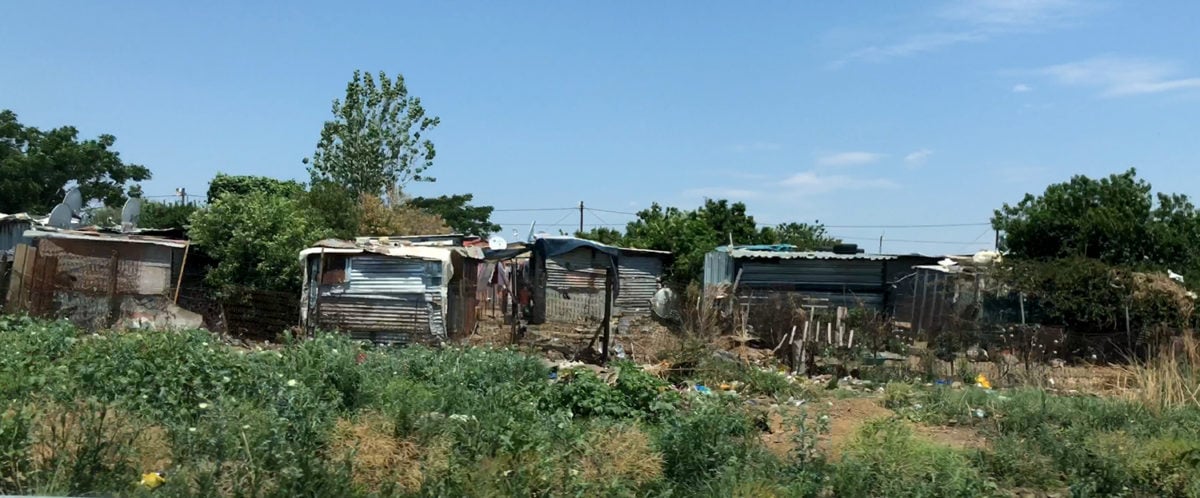

Between the jumble of huts, lines of washing dry in the African sun. Mothers, with babies on hips or swaddle,d in wraps, sweep leaves from their doorways. Barefoot toddler,s run around as large pots are stirred over open fires.
With such meager living conditions, you’d forgive the residents for emerging less than pristine. That’s not the case. I have no idea how they appear so crisp and well-groomed. The women, in particular, confidently swish their hips in their spotless, colorful outfits as they step away from the disarray, their black hair immaculate and gleaming.
Living in a Kruger National Park Bush Camp
As we neared our final destination, and after going through several gate check ins and security inspections, we arrived in Klaserie Private Nature Reserve. The bush camp we were making our way to, sat on 3000 hectares of private land in the reserve, offering a unique camping tour experience. We found out later that it shares an unfenced boundary with Kruger National Park.
We jiggled along the grassy tracks, becoming increasingly aware that this wasn’t quite what we had been expecting. As we rattled along in Bucky, our excitement grew. This was way beyond anything we had imagined.
For the next two and half months, our home was a wildlife paradise. Where wild animals roamed freely and where COVID-19 became a hazy memory – only being brought to mind when we ventured on the hour drive into the nearest town to get supplies, before retreating to our world of wonder. Our travel package also included a visit to Chobe National Park, a key destination known for its abundant wildlife.
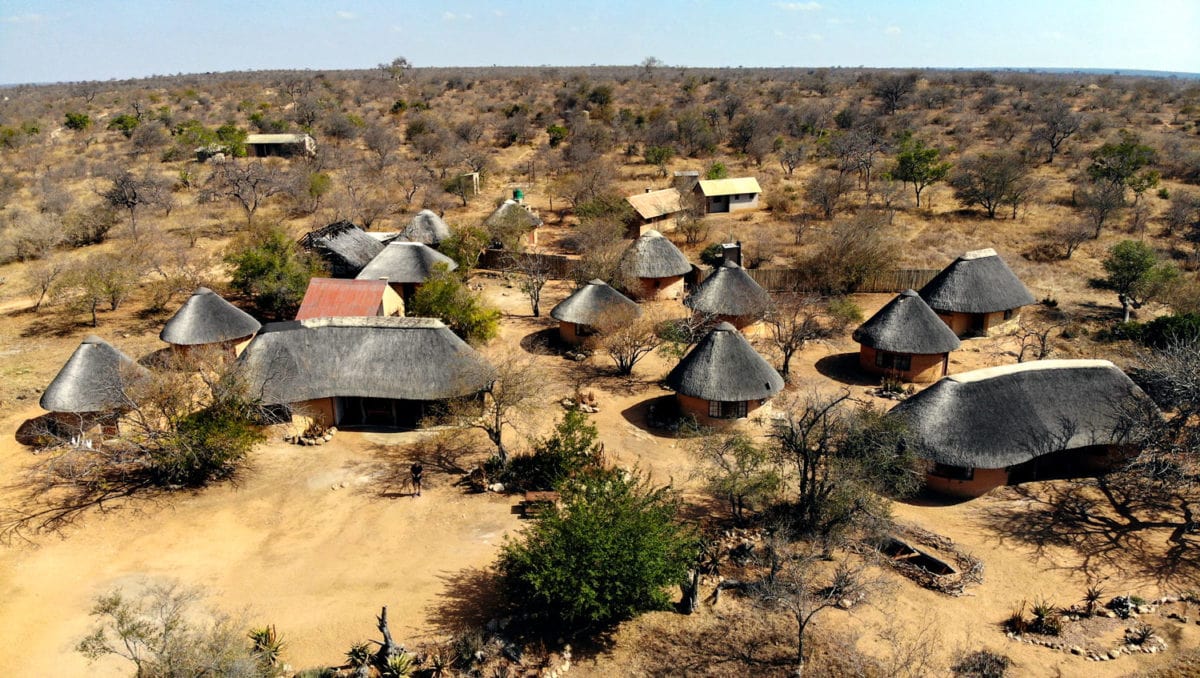

When the owners warned us that the camp was rustic and very basic, we had visions of using a ‘drop toilet’ and perhaps a bucket to wash ourselves. The bush camp’ was indeed rustic, but in a decorative sense. There was running water, flushable toilets, hot showers, a fully equipped kitchen, and a gas stove – and I could go on. Put it this way – we definitely weren’t doing it tough.
But it wasn’t only the camp itself that was a pleasant surprise, but its location.
Sharing a boundary with Kruger National Park, with no fences, meant that wild animals were free to roam through the whole area. The camp itself, only had three high placed, electrified wires that deterred elephants – and after witnessing the damage they can do to a huge tree in a matter of minutes, you can see why that is a necessary restriction. However, apart from the high wires, there was nothing separating us and the wildness of our surroundings.
Immersed in South Africa’s Wildlife Paradise
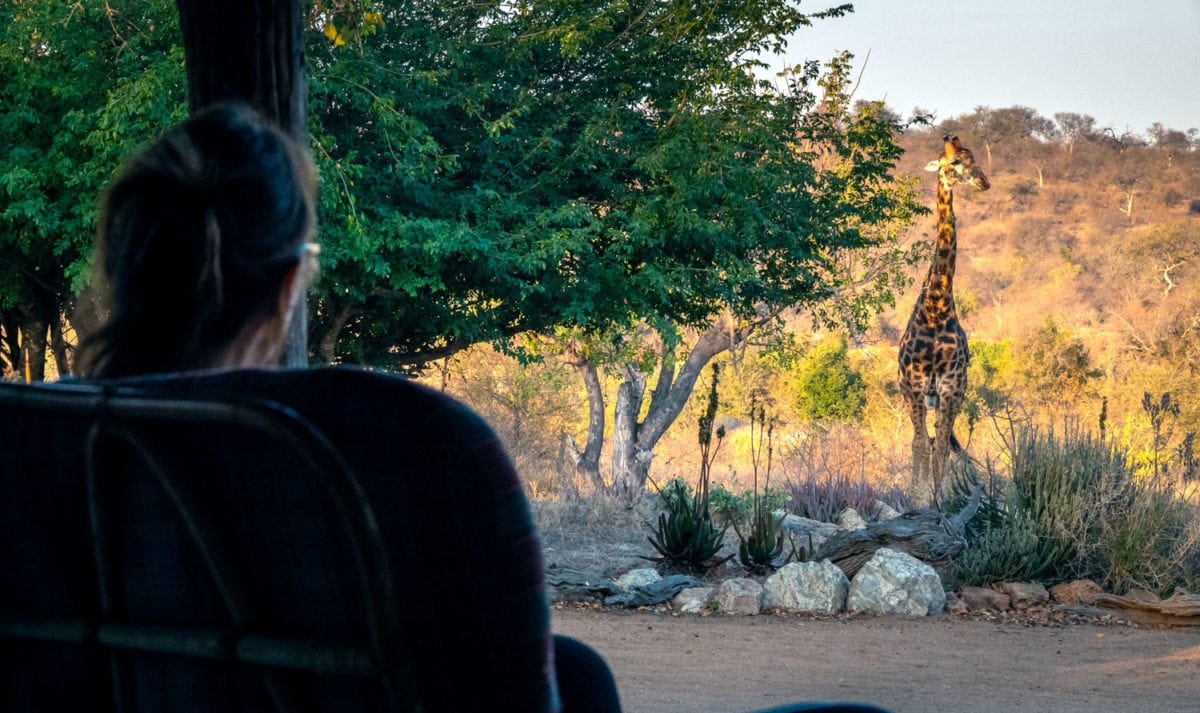

Giraffes elegantly ambled by, stopping for a measured look before presumably deciding we were no threat and continuing with their day. Cheeky baboons sauntered through the camp, and on one occasion, one even jumped through the kitchen window and stole a lemon I’d left on the bench. I would have loved to have seen its face whilst biting into that.
In fact, on most days, the whole troop passed by as they set off on their daily forage before returning again late afternoon to roost in the riverside trees. It was so cute watching the baby baboons ride their mother’s backs like tiny jockeys as the troop passed by in a single file.
Either close by camp, in camp or while out driving in the reserve in our overland truck, we watched impala, kudu, zebra, rhino, buffalo, lion, hyena, leopard and elephants, all going about their daily business.
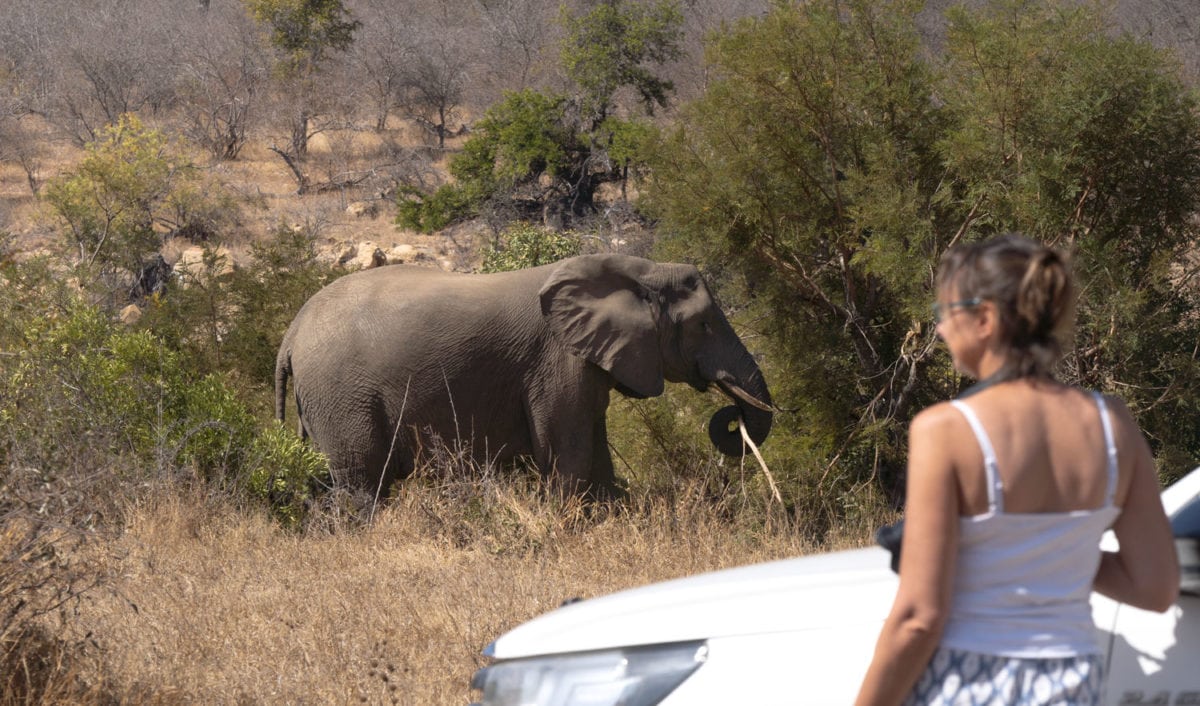

We learnt which animals to be wary of, the noises they made, the tracks they left behind as clues to their presence and most of all, we learnt to be present. Really present.
A simple grumble of your own stomach had your senses on alert. Learning the sounds of the African bush brought us back to ourselves. You have to live in the moment.
Interestingly, most of the animals seemed just as wary of us as we were of them. Even the lioness who stopped dead in her tracks when she spotted us didn’t seem bothered.
Leopard Encounter
However, if we did accidentally get too close, surprising both parties, most animals hastily made their retreat. Or, as in the case of a female leopard I encountered one afternoon, only a few meters from our hut, made it clear in no uncertain terms that one of us had to back off. On that occasion, I was more than happy to oblige.
Her face screwed up as our eyes met, and her low growl certainly disclosed her unease. Those few backward steps toward the hut seemed like an eternity. After I was out of sight, she made her way back towards the river, continuing to grumble about the incident. I would have liked to tell her that I was not too impressed with the situation either, but she didn’t seem to be in quite the right frame of mind.
South Africa Nature Grounds the Heart, Spirit, and Soul
I believe it was that chance of danger, that unpredictability, that feeling of being in the epicenter of nature’s core that had such a profound effect on our sense of being. Traveling has brought us new experiences, different perspectives, and increased knowledge of other cultures – but this. This awakened a consciousness not experienced before.
Perhaps it awakens memories buried deep in our DNA; perhaps it is the raw manifestation of the need to survive. I don’t know how it happens. I just know that being in nature – and being among those wild animals felt like a grounding of heart, spirit and soul. A feeling of coming home – even though miles from home.
Read about how to take brag-worthy safari photos with these safari photography tips!
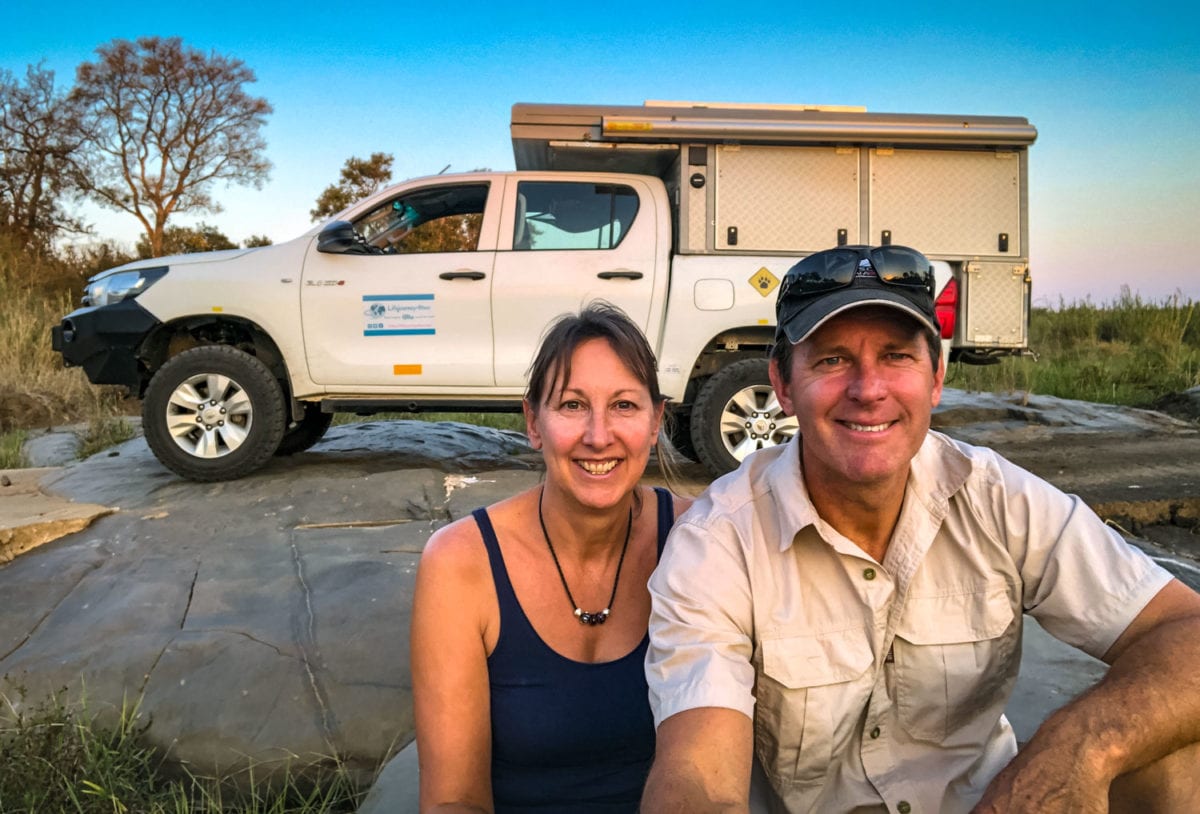

Change and Hope in the Time of COVID-19
It was easy for us to find our silver linings, and the bush camp experience was one-edged with gold and platinum. But now, as the world still reels from this pandemic, it’s more important than ever for us all to find them. That tiny voice of change is getting louder, and hope is being found beneath the rubble.
Vaccines are coming, and while travel may still take a while to emerge from its forced cocoon, I believe that when it does, we will view it with fresh eyes. There is a world of wonder and silver linings to be discovered.
And as catastrophic as it is, COVID has given the planet a well-earned breather from the drastic ceasing of over-tourism, a small respite from CO2 emissions, and a reduction in air pollution.
There are lessons we can learn, and the changes, as a result of COVID can enhance our journey.
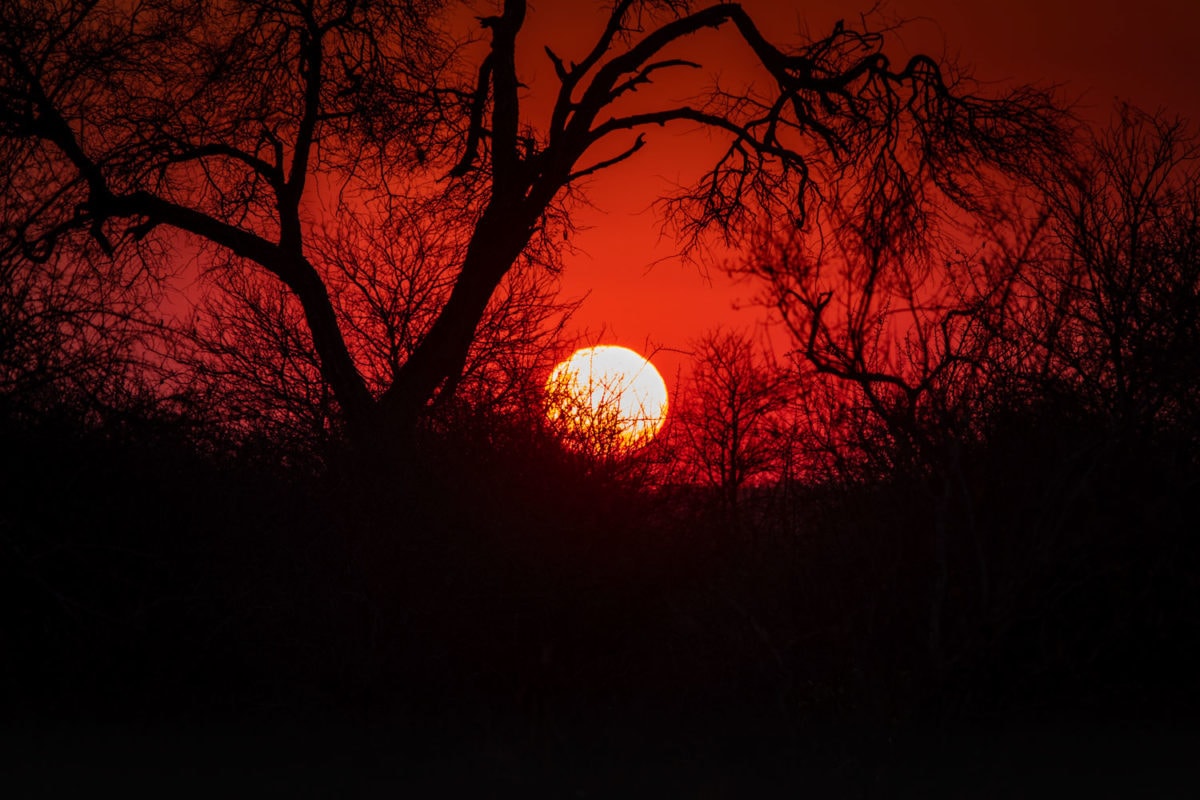

I hope, as we embark on new adventures and the travel industry recovers, that we have learned the biggest lesson from COVID-19 – that there is nothing that we should be taking for granted. I hope we move forward with a global responsibility for our planet, its people, and its wildlife.
Our plans have been scuppered, but the silver linings shine through.
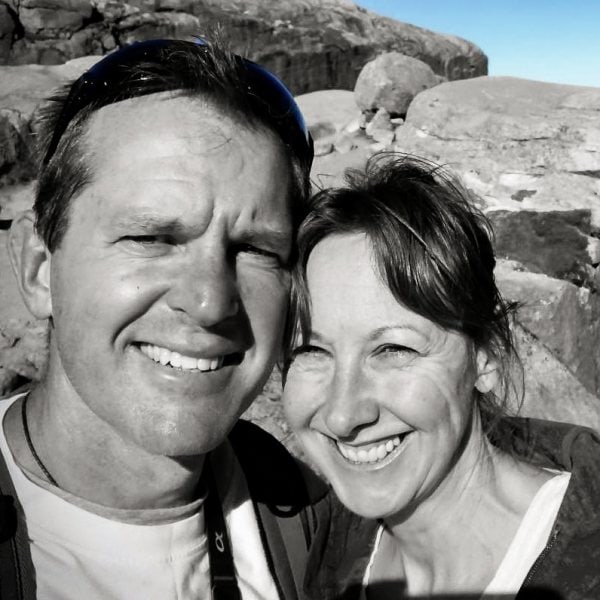

Meet the Authors: Shelley and Lars of Lifejourney4two sold up everything in Australia to embark on a travel adventure back in 2017. Their planned one-year of travel has become an open-ended journey as they continue to road trip around the world, sharing their travel stories, inspiration, road trip itineraries, and off-the-beaten-path destinations. They combine their travel and photography passions to create a high-quality travel blog encouraging readers to ‘Make one day – day one.’
Lifejourney4two.com | Facebook | Instagram | Twitter | LinkedIn


:max_bytes(150000):strip_icc()/TAL-looking-glass-falls-BREVARDNC0923-3ef39488dfce421f8232066e673b8cc8.jpg?w=1300&resize=1300,800&ssl=1)



:max_bytes(150000):strip_icc()/TAL-header-viewing-deck-lion-sands-ivory-lodge-LIONSANDIVORYLDG1225-98555b7d30c24d7582e734955068196e.jpg?w=1300&resize=1300,800&ssl=1)

:max_bytes(150000):strip_icc()/tl-woman-walking-on-caribbean-beach-in-akumal-mexico-bf-tout-75bb4e5f1d3a44ebb6f836d58d862bd2.jpg?w=1300&resize=1300,800&ssl=1)


:max_bytes(150000):strip_icc()/tal-gifts-under-10-tout-morgan-ashley-parker-02-1-7deae620c7f64ed3883f75edf1c5930e.jpeg?w=1300&resize=1300,800&ssl=1)
